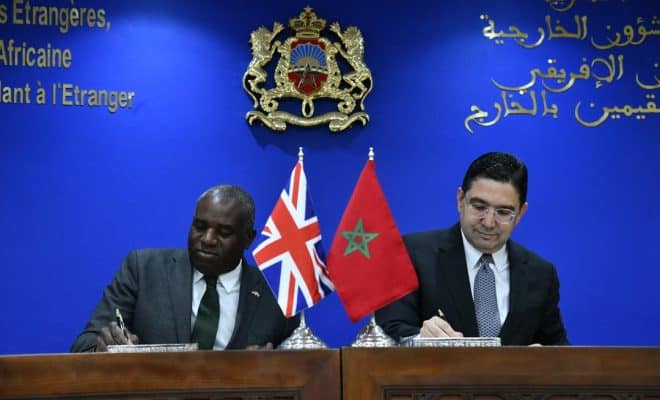Heritage Newspaper / 02/Jun/2025 /
UK Backs Morocco’s Sahara Autonomy Plan as “Most Credible Solution” in Historic Shift
In a diplomatic bombshell reverberating across the globe, the United Kingdom has thrown its full political weight behind Morocco’s 2007 autonomy initiative for the Moroccan Sahara, calling it the “most credible, viable and pragmatic basis” for resolving one of North Africa’s most enduring conflicts.
The announcement, delivered in a joint communiqué signed in Rabat, signals a seismic shift in Western policy on the Sahara issue and opens a new chapter in UK-Morocco relations.
The statement, signed by UK Secretary of State for Foreign, Commonwealth and Development Affairs David Lammy and Moroccan Foreign Minister Nasser Bourita, affirms London’s intention to act “bilaterally, regionally, and internationally” in alignment with Morocco’s autonomy proposal.
Analysts say this marks a major evolution in UK foreign policy, from cautious neutrality to proactive endorsement.
Issued from the Moroccan Foreign Ministry’s headquarters, the communiqué highlights Britain’s confidence in Morocco’s leadership and reform trajectory under King Mohammed VI.
“The UK follows closely the current positive dynamic under His Majesty,” the document reads, underscoring Britain’s alignment with Rabat’s strategic vision.
The British government went further by pledging potential economic backing for projects in the Sahara, specifically under the UK Export Finance program, which has earmarked £5 billion to support business ventures in Morocco.
This economic support, observers note, could significantly boost development in the southern provinces and lend legitimacy to Morocco’s autonomy framework.
Echoing strategic shifts by other global powers like the United States, France, and Spain, the UK’s declaration consolidates a growing bloc of Western nations coalescing around Morocco’s plan.
This collective momentum appears to marginalize opposing voices and could isolate actors who continue to promote outdated or maximalist positions.
London’s statement emphasized the crucial importance of resolving the Sahara dispute for regional stability and integration.
“A resolution would strengthen the stability of North Africa and relaunch the bilateral dynamic,” it affirmed, pointing to a broader vision of economic and political cooperation across the Maghreb and beyond.
In a significant nod to multilateralism, the communiqué reaffirmed the central role of the United Nations in shepherding the peace process.
Both countries voiced firm support for the efforts of UN Secretary-General's Personal Envoy, Staffan de Mistura, pledging active engagement to help move talks forward.
As a permanent member of the UN Security Council, Britain’s position carries considerable diplomatic weight.
“The time for a resolution is long overdue,” the document states, calling for urgent action that would serve “the interest of the parties” and regional security.
British officials have also recognized Morocco’s strategic position as a gateway to African development, underlining the kingdom’s growing importance as an economic and diplomatic partner on the continent.
This aligns with London's post-Brexit strategy of cultivating new global alliances and investment pathways.
Diplomatic sources suggest that the UK’s announcement could accelerate international efforts to finalize a settlement and embolden other undecided states to follow suit.
The growing consensus may also pressure separatist elements and their backers to reassess their positions.
Observers described the moment as a diplomatic watershed, celebrating it as a victory for stability, realism, and constructive regional engagement.
British and Moroccan officials also hinted at upcoming bilateral projects aimed at deepening cooperation, especially in energy, education, and trade.
The UK’s strategic pivot is expected to translate into expanded economic activity and long-term investments in Moroccan territory, including the Sahara.
Meanwhile, foreign policy experts are calling the UK’s shift a “game-changer” that may reshape the balance of power in North African geopolitics.
The move could also impact upcoming UN deliberations and Security Council votes, where Britain’s voice will now echo Morocco’s stance with renewed clarity.
While the full ramifications of this diplomatic development remain to be seen, one thing is certain: the United Kingdom has sent a clear message to the world. It is ready to back pragmatic, lasting solutions and Morocco’s autonomy initiative stands at the forefront of that vision.

No Comment Yet!